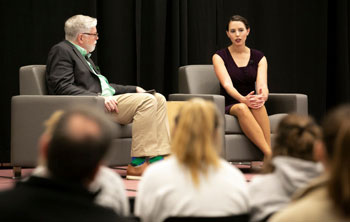LOUISVILLE—Rachael Denhollander, the former gymnast who helped catch serial sex abuser Larry Nassar, said it was her worth in Christ that led her to seek justice and ultimately forgive the man who molested her.
Justice and forgiveness were among the main topics of #MeToo and You: A Conversation with Rachael Denhollander, sponsored by The Veritas Forum and Kentucky Baptist Campus Ministry at the University of Louisville.
Denhollander was the first to file criminal complaints against Nassar, now serving what amounts to life in prison. During his testimony, Nassar admitted to assaulting Denhollander when she was a teenager in 2000.
As part of the plea deal, Nassar was forced to listen as nearly 100 of his accusers spoke about how, after winning their trust, he molested them. The stories were graphic and heart-wrenching.

Buck Run Baptist Church Pastor Hershel York talks with former gymnast Rachael Denhollander during an event at the University of Louisville this past week.
“It was a real struggle during that time to hold onto the identity I have in Christ,” Denhollander said. “I was not bitter or angry. I pitied who he had become.”
Denhollander said because of his destructive choices, Nassar shut himself off from everything that is good and beautiful. Unlike her, Nassar will never have the joy of being in a loving, trusting marriage or holding his own children safely in his arms.
Denhollander lives in Louisville with her husband, Jacob, and their four young children.
“Larry had to sit in the courtroom day after day listening to all the terrible things he had done,” she said. “By the end of the process he was heavily medicated, just so he could sit through the proceedings.
“What if I was sitting in that chair and all the nasty, mean thoughts, or words or actions, the vindictive things I’ve done, what if I had to sit there and hear the pain I caused?”
Through Christ, she said, God not only brings justice, but He loves us enough to take the justice upon Himself.
“What that means is I can release all my vengeance and anger without minimizing what happened to me,” she said. “I can be forgiving. Move forward and begin to heal.”
Hershael York said after listening to Denhollander speak, it was obvious that her personal relationship with Christ was at the heart of helping her cope with emotional pain.
York, dean of the School of Theology at The Southern Baptist Theological Seminary, served as moderator of the event.
“Hers was an articulation of the gospel like few others,” said York. “We talk about forgiveness, forgiveness, forgiveness and we don’t really talk about justice. The gospel is a gospel of justice. She expresses that beautifully.”
Denhollander said she found solace in reading the Bible, particularly passages in Revelation that talk about God coming back as a judge against evil.
“We have a God who says, ‘This is evil, and it matters, and I will come back and deal with it,'” she said. “That was the greatest comfort to me as an abuse victim.”
Denhollander said victims need people around them who can speak the truth and confirm that actions against them were evil. They also need people who can grieve with them.
“It’s a powerful combination to be able to empathize with a survivor and speak the truth because there’s so many lies survivors hear not only in their own minds, but in our culture,” she said.
Sexual abuse is not something that just happens in other places,” she continued. “It’s happening on our universities, in our churches and in our communities, and it’s often from people we least expect. The abusers know that. They create and seek out environments where they can manipulate people.”
York said churches should be doing more to arm themselves against the sin of sexual abuse.
“We need to do everything we can to keep people safe, to protect our children and protect each other.”
As pastor of Buck Run Baptist Church in Frankfort, York said his church knows if there’s ever a report of sexual abuse, they should call the authorities first. Before they even tell him.
“There is no other move here, otherwise it looks like we are protecting predators,” York said.
November 22 will mark one year since Nassar confessed.
Denhollander said a lot of the survivors have been asked, “Why aren’t you over this yet? You got to stand up and look your abuser in the face? Why aren’t you healing?
“We are so eager to get to healing and forgiveness that we skip the recognition of how evil things are in the world. Healing is not about saying some key words. It’s work, and you need to give yourself time to go through the process.
She explained, much like being hit by a car, the bones may mend, and the survivor may forgive the driver, but there’s still scars and residual pain.
“Healing is not becoming the person you were before,” Denhollander said. “Healing is knowing what to do with the pain when you do have it and learning to grieve in a way that is not destructive.” (KT)
Robin Cornetet